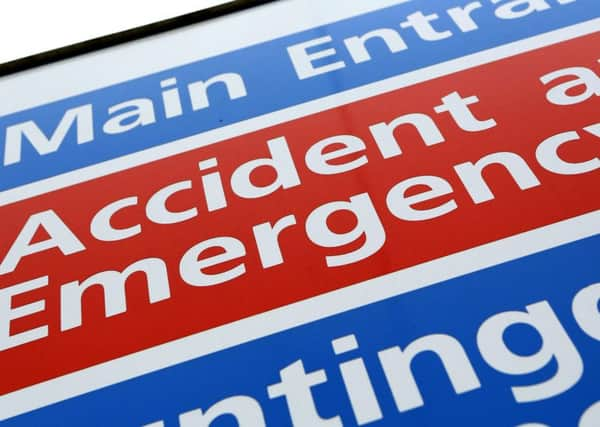Tom Richmond: The NHS is not facing a humanitarian crisis. The real crisis is with its management


It is, however, facing a leadership crisis because the powers-that-be don’t have the management skills. This was made abundantly clear by the feeble political response to weekend reports that patients were dying on trolleys in A&E – or, in the case of Hull Royal Infirmary, told to stay away unless ‘seriously ill’.
First was Labour leader Jeremy Corbyn who stood outside a casualty unit and challenged Theresa May to make an emergency statement to Parliament. What he did not acknowledge is that many financial pressures stem from Tony Blair and Gordon Brown’s flawed PFI policy – ‘build now and pay later plus interest’ – which was used to bankroll new hospitals. And then there was New Labour’s ill-advised decision to dramatically increase the pay of GPs without attaching sufficient conditions about out-of-hours care provision.
Advertisement
Hide AdAdvertisement
Hide AdThat said, the Prime Minister was equally disingenuous. Mrs May said the NHS was implementing a five-year plan, and that the Government had already provided more funding than requested. Effectively absolving herself of personal responsibility, the Tory leader added: “We’re looking for best practice.” In short, better management – rather than more money – is her personal remedy. If only it was that simple...
Perhaps the Prime Minister – still to visit these parts since moving into 10 Downing Street six months ago – would like to visit Yorkshire where Tracy Brabin, the Batley & Spen MP, has asked Mid Yorkshire Hospitals NHS Trust to explain itself after being contacted by constituents over care at Dewsbury A&E.
Their complaints, say Ms Brabin, include an 11-hour wait for a patient to see a doctor and another constituent spending nearly 20 hours in A&E before a bed was found.
Why does this matter? The Yorkshire Post revealed on Saturday that this debt-ridden Trust had paid £1.7m to management consultants Deloitte to help it balance its books “while maintaining delivery of safe care”.
Advertisement
Hide AdAdvertisement
Hide AdPreviously it had paid £15.5m over four years to accountants EY, formerly Ernst & Young, for similar work. This Trust is not alone – this region’s hospitals have paid nearly £40m to the ‘big four’ accountancy firms for consultancy work. Multiply this across the country and suddenly there’s money to pay for a small army of nurses, doctors and ancilliary staff.
Yet what are the well-remunerated directors and chief executives of NHS trusts actually doing? If they’re so dependent on outside advisers, they shouldn’t be in the job.
What about Leeds-based NHS England which advertised last year for a £99,000-a-year glorified exhibition organiser? Its head office staff should include leaders who have the expertise to assist local trusts.
And what about the Department of Health? Cabinet minister Jeremy Hunt, in a humiliating admission of failure, has now had to abandon the four hour A&E waiting time target because of out of control winter pressures. From what I see, there is no chain of command. No-one, locally, regionally or nationally, is prepared to take responsibility.
Advertisement
Hide AdAdvertisement
Hide AdFrom what I see, there is no chain of command. No-one, locally, regionally or nationally, is prepared to take responsibility.
Yet I have news for them. It could be far worse. I know of many people with flu-like symptoms who deliberately tried not to trouble their GP because they did not want to add to the Health Service’s woes.
This political state of emergency will not be solved until GP services are fit for purpose, particularly at weekends and in the evenings, and there’s clarity on the respective roles of the state, and families, on the care needs of the elderly.
Again the Prime Minister ducked this, pointing to the freedom given to local authorities to add an additional precept to council tax bills for a limited period.
Advertisement
Hide AdAdvertisement
Hide AdThis is not new – Edwina Currie said at the weekend that the same problems and dilemmas existed 30 years ago when she was Health Minister while Ann Widdecombe regretted not being able to advance the debate two decades ago when she was Shadow Health Secretary.
They suggest better triage systems in A&E units and GPs spending more time treating patients in care homes, lessening the likelihood of hospital admissions which can be bewildering to the frail and confused. When will a leader emerge who is prepared to plan for the long-term?
Yet the Prime Minister has been offered a helping hand. The chairs of Parliament’s public accounts, health and communities select committees – Meg Hillier, Dr Sarah Wollaston and Clive Betts – have offered to work together to forge a long-overdue “political consensus”.
Mindful of her new sobriquet ‘Theresa Maybe’, the Prime Minister should seize the initiative, accept the invitation and allow these committee chairmen to come up with a framework for the future which both the Tories and Labour can coalesce around once NHS England’s current five-year plan runs its course. It will be more effective than wasting more money on management consultants who are bleeding the National Health Service dry.
Advertisement
Hide AdAdvertisement
Hide AdAs far as I’m concerned, the Government should be reviewing every non-frontline role to see if it can be justified in these challenging financial times – patients, and medical staff deserve better than all those managers unable to lead or cure the NHS of its ills.